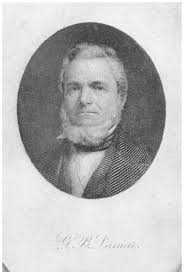Gazaway Bugg Lamar
| Gazaway Bugg Lamar | |
|---|---|
 | |
| Born |
October 2, 1798 Augusta, Georgia |
| Died |
October 5, 1874 Brooklyn, NY |
Gazaway Bugg Lamar (1798-1874) was a steamboat pioneer from Georgia who went on to found a Wall Street bank. After the start of the American Civil War, he returned to his native Georgia and became active in banking and supporting the war effort in several ways including founding the Importing and Exporting Company of Georgia one of the blockade runners of the American Civil War. At war's end and with Sherman's troops approaching, he took Lincoln's oath (sometimes called the Proclamation of Amnesty) to uphold the United States constitution in return for the promise that all his property rights would be restored. It took until 1874 before he received a settlement of almost $580,000, a huge sum at that time.
Career
Born near Augusta (likely in the Sand Hills area) he was the son of Basil Lamar and Rebecca Kelly. His father had been a charter member of the Steamboat Company of Georgia and by the time of his father's death when Gazaway was 29, the son had become active in the shipping business in Savannah and Augusta.[1] In 1821 he married Jane Meek Creswell of Savannah and his business activities there included banking and ship owning. In 1834 an act was passed in the U. S. Congress allowing him to "import free of duty any iron steamboat...for the purpose of making an experiment of the aptitude of iron steamboats for the navigation of shallow waters..."[2] In 1834 a pre-fabricated steamboat was landed and re-assembled at a Savannah shipyard. This boat was named the John Randolph. Today there is a historical marker in Savannah next to the Maritime Fountain on River St. titled "S.S. Savannah" and "S. S. John Randolph". During this time in Savannah he sold at least one steamboat named the Zavala to Texas while his cousin Mirabeau Buonaparte Lamar was President of Texas.
By 1846 Gazaway had moved to New York and in 1850, along with some associates founded the Bank of the Republic with $1,000,000 capital,.[3] Another investment was in Knoxville, TN where a hotel he invested in was renamed the Lamar House Hotel, associated with the Bijou Theater.[4] Around this time his son, Charles Augustus Lafayette Lamar had become a thorn in his side, especially through his ownership of The Wanderer (slave ship).[5] Meanwhile, in New York, Gazaway had become a valued contact for Southern governments, arranging loans, printing bonds and as the war neared, actually buying semi-obsolete rifles from the federal arsenal for the states of Georgia and South Carolina. At the start of the Civil War his wife (second wife, the first having drowned in the sinking of his steamboat Pulaski) was in poor health, and she died soon after. True to his native state, Gazaway had returned to Georgia by early 1861 where he was active in banking. In the Spring of 1863 ten men including Lamar announced the forming of the Importing and Exporting Company of Georgia.[6] It was late in the war and the Union blockade was getting stronger and stronger so this venture, like the confederacy, was doomed.[7] When Savannah fell, it is estimated that something like 10% of the cotton seized by Sherman belonged to Gazaway Lamar.
After the war ended Gazaway Lamar waited before putting in a claim to the Federal government for his seized property. After the U. S. Supreme Court ruled in United States v. Padelford that the oath required by Lincoln was all that was needed to receive compensation, and the appeal of that ruling, he was awarded $579,343.71.[8] This was reported to be the largest individual settlement, but was less than actually applied for. Six months after winning the final appeal, he died at age 76 on October 5, 1874 and the funeral was from the home of his daughter Mrs. Robert Soutter and he was buried in Alexandria, Virginia.
In an interesting twist of fate, early in the 21st century an old rolled up telegraph message was found and eventually given to a museum in Charleston, S.C. The telegram was dated April fourteenth, 1861 from the Governor of South Carolina to Gazaway Bugg Lamar in New York with a most interesting message, part of which is told below: (for the complete text see "External Links", Ft. Sumter telegram).
"Fort Sumter surrendered yesterday after we had set all on fire... F.W. Pickens"
See also
- Thomas Robson Hay, "Gazaway Bugg Lamar, Confederate Banker and Business Man", The Georgia Historical Quarterly Vol. 37, No. 2 (June, 1953), pp. 89–128
- Steamship Zavala, http://www.numa.net/expeditions/zavala/
References
- ↑ Thomas Lamar Coughlin, "Those Southern Lamars" ISBN 0-7388-2410-0
- ↑ Thomas Lamar Coughlin, "Those Southern Lamars" ISBN 0-7388-2410-0
- ↑ Thomas Lamar Coughlin, "Those Southern Lamars" ISBN 0-7388-2410-0
- ↑ Dean Novelli, "On a Corner of Gay Street: A History of the Lamar House—Bijou Theater, Knoxville, Tennessee, 1817 – 1985." East Tennessee Historical Society Publications, Vol. 56 (1984), pp. 3-45.
- ↑ Thomas Lamar Coughlin, "Those Southern Lamars" ISBN 0-7388-2410-0
- ↑ Mathis, Robert Neil, Gazaway Bugg Lamar, A Southern Entrepreneur, Graduate Dissertation U GA, 1968
- ↑ Stephen Wise, Lifeline of the Confederacy, University of South Carolina Press, 1988
- ↑ Thomas Lamar Coughlin, "Those Southern Lamars" ISBN 0-7388-2410-0
External links
- Find a Grave http://www.findagrave.com/cgi-bin/fg.cgi?page=gr&GRid=26542376
- Records Relating to Gazaway Bugg Lamar at the National Archives at College Park, MD https://catalog.archives.gov/id/12006022
- G. B. Lamar papers in library Univ. of Georgia http://hmfa.libs.uga.edu/hmfa/view?docId=ead/ms10-ead.xml;query=;brand=default
- Ft. Sumter telegram http://www.postandcourier.com/article/20110413/ARCHIVES/304139995
- G. B. Lamar papers donated http://dining.savannahnow.com/accent/2011-07-08/papers-donated-georgia-historical-society-offer-fresh-insight-prominent-savannah#.UrTQqjJ3vIU
- Savannah Historical Marker http://www.lat34north.com/historicmarkers/LargePhoto.cfm?keyId=025-3&PicSuffix=&MarkerTitle=SS%20Savannah%20and%20SS%20John%20Randolph
- Lincoln's Oath http://www.freedmen.umd.edu/procamn.htm
- Importing and Exporting Company Stock certificates:http://ghs.galileo.usg.edu/ghs/view?docId=ead/MS%200413-ead.xml;query=;brand=default